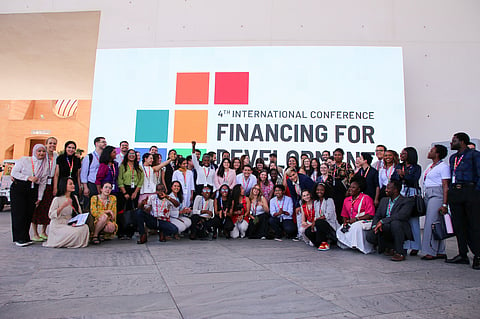

The Fourth International Conference on Financing for Development (FfD4) took place from June 30 to July 3, 2025 in Seville, Spain, marking a pivotal moment for global cooperation on sustainable development.
FfD4 marks the 80th anniversary of the United Nations (UN) and arrives amid rising debt, climate risks and a $4.2 trillion annual financing gap for developing countries, highlighted Philemon Yang, president of the United Nations General Assembly. It serves both as a review of past commitments and a launchpad for new action through the Seville Platform for Action and Compromiso de Sevilla, the outcome document.
The UN Economic and Social Council (ECOSOC) President, Bob Rae, echoed the urgency, identifying four key goals for reinvestment in the pillars of sustainable development: Closing the financing gap for UN-mandated Sustainable Develeopment Goals, reforming global financial institutions to reflect today’s realities, building trust and transparency and combating common threats like unilateralism and corruption.
World Bank Group President Ajay Banga outlined reforms to boost efficiency and private sector engagement, but acknowledged that the funding gap remains vast. “We’ve raised $250 billion through bonds, but it’s not enough,” he said, calling for domestic resource mobilisation, regulatory policy reforms in countries and a focus on sectors like infrastructure, health and agriculture to generate jobs.
International Monetary Fund (IMF) Deputy Managing Director Nigel Clarke stressed three critical points: Domestic reforms, coordinated and tailored support for development and improved debt restructuring processes. She highlighted the IMF’s expanded concessional lending and technical support, but insisted that more is needed to manage debt and ensure financial stability in developing economies.
World Trade Organisation (WTO) Director-General Ngozi Okonjo-Iweala warned of a dramatic slowdown in global trade and urged rule-based, cooperative solutions rather than unilateral approaches, especially for LDCs. Trade, she emphasised, is rightly recognised as a pillar of development in the Seville commitment.
Developing countries rallied around key themes: Equitable access to finance, fair representation and urgent debt relief. Speaking for the Group of 77 (G77) and China, Iraq reaffirmed support for multilateralism, firmly reiterated North-South cooperation and demanded both the “quantity and quality” of finance. Angola, representing African States, called for a new financial model, institutional reform and Africa’s full participation in decision-making. The group highlighted the urgency of sovereign debt relief and infrastructure financing.
Kenya and Tanzania focused on sovereign debt reform, credit rating fairness and national ownership. Mozambique proposed regional banks for the green economy and blended finance, while Honduras highlighted the credit challenges faced by Micro, Small and Medium Enterprises and urged a justice-based financing model. Sudan emphasised international cooperation and partnerships and leaders from the Islamic Republic called for innovative instruments to bridge resource gaps.
Representing the Least Developed Countries (LDC), Nepal pointed out that while global gross domestic product or GDP rose from $75 (about Rs 6400) to $115 trillion in the last decade, LDC debt tripled and digital and trade divides deepened.
The European Union (EU) reaffirmed its leadership in global aid (accounting for 42 per cent of total sustainable aid) and called for a mix of public, domestic and private resources. The EU also highlighted domestic tax mobilisation and joint investment platforms as key strategies going forward.
France proposed global tax initiatives and called for a “finance shock” by leveraging greater concessional finance, private investment incentives and risk-sharing mechanisms. Portugal advocated for a financial system tailored to the most vulnerable, such as Small Island Developing States and LDCs. Poland and Estonia focused on technical assistance and public-private partnerships.
Despite diverse national contexts, a strong convergence emerged around a few shared priorities. There was broad consensus on the urgent need to reform the global financial architecture, including the IMF, World Bank and credit rating systems, to reflect today’s economic realities, along with a central concern for sovereign debt and emphasis on the importance of mobilising domestic resources.
As the opening plenary closes, the Compromiso de Sevilla offers a political opportunity to realign global finance with sustainable development realities, but delivery will be the true measure of its success. With high-level thematic sessions and negotiations continuing throughout FfD4, all eyes now turn to whether Seville will mark a turning point or yet another missed opportunity.